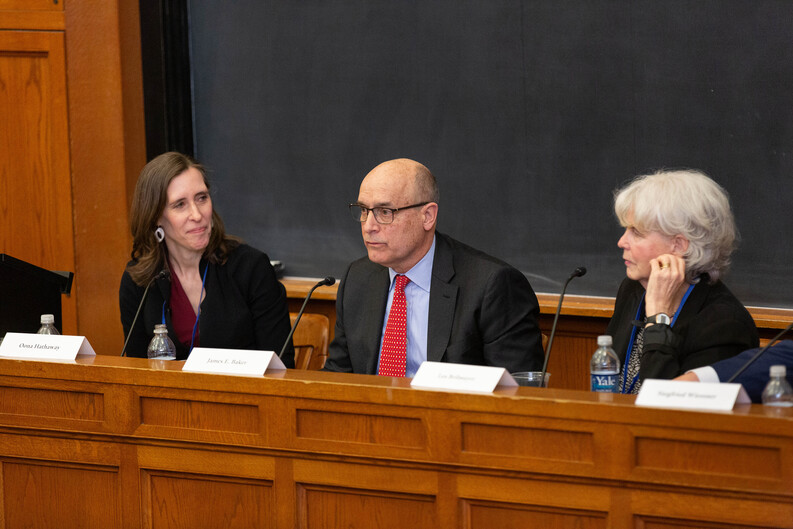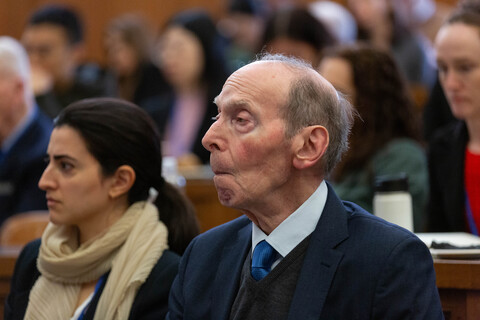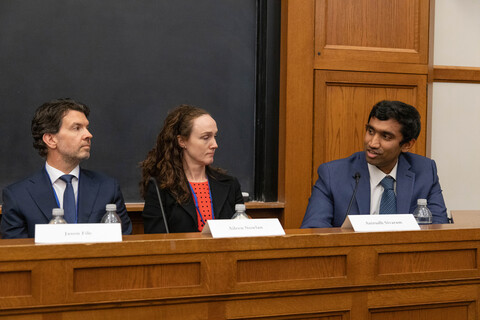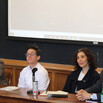Conference Honors Professor W. Michael Reisman and Journal He Helped Inspire

This year marks two milestones for international law at Yale Law School — 50 years of a student-led journal on the topic and the retirement of Myres McDougal Professor Emeritus of Law W. Michael Reisman ’64 LLM, ’65 JSD, the champion of a scholarly movement that inspired his students to start the publication.
To celebrate both the Yale Journal of International Law’s golden anniversary and Reisman’s work, the Yale Law School Center for Global Legal Challenges hosted a daylong conference on March 8 that drew legal scholars from around the world. Speakers, who included Reisman’s former students, presented research and discussed topics in international law ranging from the Russia-Ukraine War to the use of coercive economic sanctions.
The event drew more than 150 people to Yale Law School from as far away as Hong Kong, Singapore, Japan, and Thailand. Conference participants included roughly 20 former editors of the journal, which is known as YJIL, and other Yale Law School alumni dating back to the class of 1971. The journal’s current editors were in attendance, along with Yale Law School faculty. Many others joined the event via livestream.

“What this conference has become is a celebration, really, of community,” said Professor Oona A. Hathaway ’97, Director of the Center for Global Legal Challenges. “It’s a community founded in a commitment to global justice. It’s a community committed to a world governed by law. And it’s a community committed to the power of ideas and ideals and a community committed to the world. I can think of no better way to celebrate a community that YJIL and Michael Reisman have together built over a half century.”
The Yale Journal of International Law began in 1974 as Yale Studies in World Public Order without the official support of the administration. The students were adherents of an approach to international law known as the New Haven School, of which Reisman is the leading proponent. In a 2007 commentary, Reisman and co-authors described the school’s approach as adapting “the analytical methods of the social sciences to the prescriptive purposes of the law.”
Reisman’s work and legacy and the anniversary of YJIL is also showcased in a new exhibit prepared by the Lillian Goldman Law Library. Reisman himself recounted the journal’s history in a 1999 essay for its 25th anniversary.
The New Haven School was developed by Sterling Professor of International Law Myres S. McDougal ’31 JSD (1906–1998) and Yale political scientist and Professor of Law Harold D. Lasswell (1902–1978) in the 1960s. Reisman carried on the school of thought after its founding era and is credited with adding new insights to the approach. Sterling Professor of International Law Harold Hongju Koh has called Reisman “the Dean of the New Haven School,” noting that he gave the movement “its modern relevance and vitality.”

Along with panels on the New Haven School and the application of Reisman’s work to present-day issues, the conference also had former YJIL editors and J.S.D. students sharing their memories of Reisman as a teacher. His courses have included international investment law, international commercial arbitration, jurisprudence, law of the sea, law of war, and peacemaking.
“I can still see in my mind … the classroom right now with him at the front and my classmates on either side of me,” said Kathleen Claussen ’10, now Professor of Law at Georgetown Law, who helped co-organize the conference. “And I know I’m joined by a chorus of hundreds more who were inspired or enabled to pursue our careers by those classes.”
The conversations gave the journal’s current editors a new perspective.
“As a student editor, it is sometimes easy to become detached from YJIL’s history, which was to produce knowledge with the aim of promoting international justice, peace, and prosperity,” said Ali Hakim ’24, the current editor-in-chief. “Celebrating YJIL’s 50th anniversary alongside previous generations of YJIL's editors gave me a deeper understanding of our shared history.”
The conference was co-organized by YJIL editors, including Hakim, Philsan Isaak ’25, Inbar Pe'er ’25, Catey Vera ’26, and Sarah Myers ’25, incoming editor-in-chief for the journal.
Reisman said it was moving to hear from his former students how the New Haven School had affected them, noting that some acknowledged its influence on their research.
“Recalling [New Haven School founders] Mac and Harold and how much I owe them, I feel that I have passed the torch,” he said after the event. “It was a wonderful conference.”
Papers presented at the conference will be published by the YJIL in its upcoming 50th volume.
Reisman, the Myres S. McDougal Professor Emeritus of International Law, has written more than 30 books on public and private international law, jurisprudence, and human rights. He has served as counsel in many international cases and has served as arbitrator in cases including the Eritrea/Ethiopia boundary dispute, the boundary dispute over the Abyei region of Sudan, and as presiding arbitrator in the OSPAR dispute between Ireland and the U.K. He has served on the Advisory Committee on International Law for the Department of State, Foreign Policy Association, and Policy Sciences Center, Inc.


